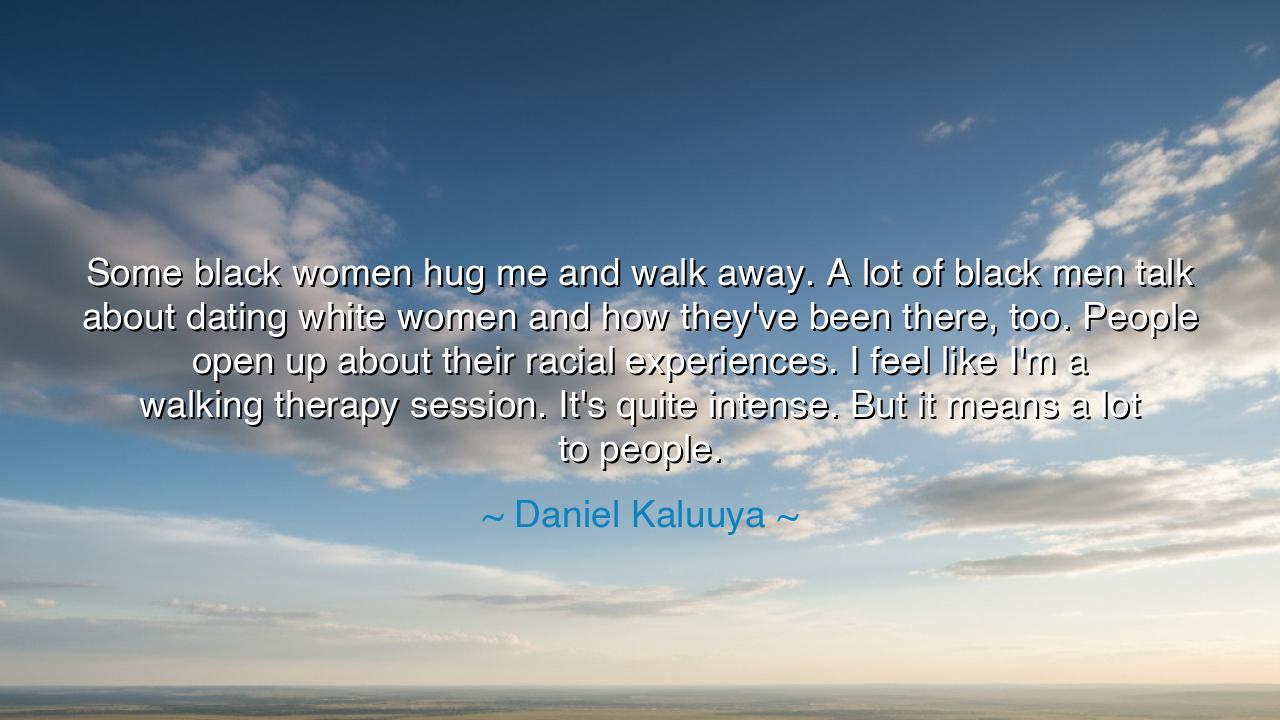
Some black women hug me and walk away. A lot of black men talk
Some black women hug me and walk away. A lot of black men talk about dating white women and how they've been there, too. People open up about their racial experiences. I feel like I'm a walking therapy session. It's quite intense. But it means a lot to people.






When Daniel Kaluuya said, “Some black women hug me and walk away. A lot of black men talk about dating white women and how they've been there, too. People open up about their racial experiences. I feel like I'm a walking therapy session. It's quite intense. But it means a lot to people,” he was speaking not only of fame, but of the burden of representation — that mysterious weight carried by those whose art reflects the deep, unspoken pain of their people. His words are not the boast of an actor basking in acclaim, but the weary confession of a man who has become, unwillingly, a vessel for a nation’s dialogue. Beneath his calm tone lies the ache of empathy, the knowledge that when art mirrors truth, it awakens both healing and hurt in those who see themselves within it.
Kaluuya’s reflection comes in the shadow of his film “Get Out”, a work that tore the veil from the quiet horrors of racial tension and identity in modern life. Through that story — of a Black man trapped within the polite, smiling jaws of white liberal society — he touched the collective nerve of a people long silenced by civility. His performance became more than acting; it became a mirror, one that forced audiences, especially Black audiences, to confront their own memories of alienation, fetishization, and fear. Thus, when he says he feels like a “walking therapy session,” he describes what happens when art becomes more than entertainment — when it becomes a channel through which pain long buried finally finds words.
In the ancient world, those who bore messages from the gods were revered and feared, for they carried not their own burdens but the burdens of the collective. Kaluuya, in this sense, stands among them. The hugs from women, the confessions from men — these are not mere fan interactions; they are rituals of recognition. Each person who approaches him seeks not the actor, but the mirror. They see in him a reflection of their own hidden wounds, their own complicated relationships with identity, belonging, and love. And as they share their stories, they perform an act as old as humanity itself — the seeking of catharsis through connection.
The philosopher Aristotle wrote that tragedy exists to purge the emotions of pity and fear, to cleanse the soul through recognition of shared suffering. Kaluuya’s experience proves that this truth endures. When people weep or confess after watching his performance, they are not merely responding to fiction — they are confronting the truths they could not speak aloud. His art, therefore, becomes medicine, and he the healer who never sought the role. But like all healers, he feels the toll of his gift. “It’s quite intense,” he admits, and in that understatement lies the exhaustion of one who listens to many hearts while tending to his own.
Yet, there is beauty in this burden. To move people so deeply that they unmask themselves before you is a sacred power — a sign that your work has transcended performance and entered the realm of truth. Kaluuya’s words remind us that storytelling, when done with courage, is not a profession but a calling. It demands empathy, patience, and the strength to carry the pain of others without letting it extinguish your own light. His story echoes the legends of the bards and prophets, who bore the histories of their people within their songs, their art becoming both remembrance and release.
The lesson here is profound: that art, when honest, becomes a bridge between isolated souls. Each of us, in our own way, is capable of this work. When you speak truth, when you share your story, you invite others to share theirs. The world grows less divided through the courage of those who dare to name their experience. Kaluuya’s “walking therapy session” is not a burden for him alone; it is a symbol of what happens when empathy moves from the screen into the human heart.
So, let us take his words as a teaching for our own time: listen deeply, and speak bravely. When someone approaches you with their pain, see it not as inconvenience but as trust. When you share your own truth, know that you might awaken healing in others. In a world that often hides behind masks of civility, be like Kaluuya — unafraid to reflect what is real, even when it is uncomfortable. For to carry another’s story, even for a moment, is to participate in the oldest form of love known to humankind: the sacred art of understanding.






AAdministratorAdministrator
Welcome, honored guests. Please leave a comment, we will respond soon